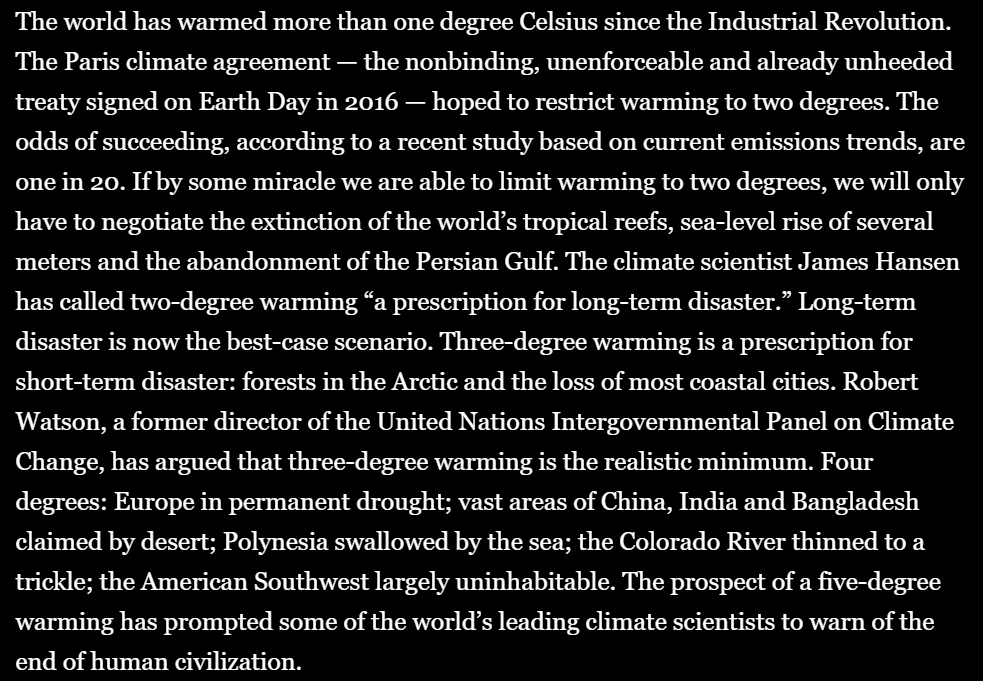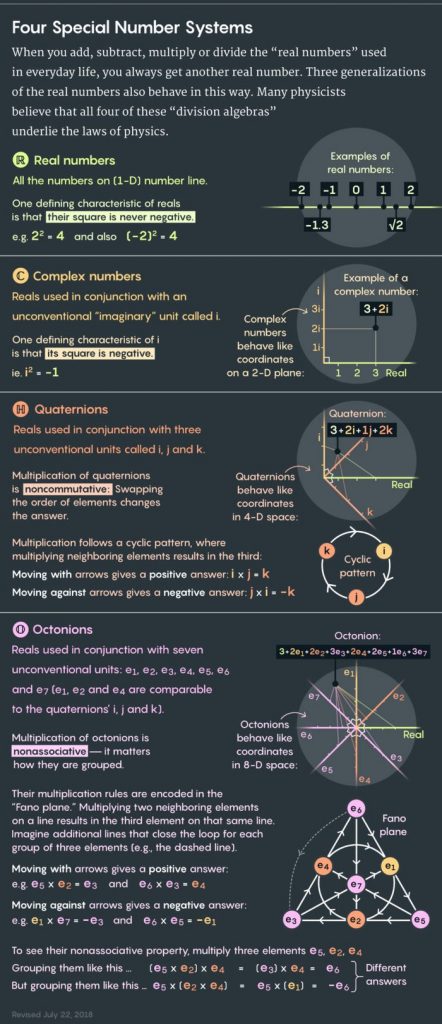Losing Earth
[avatar user=”malm” size=”small” align=”left” link=”file” /]
Losing Earth is a must-read from the NYT on 1979-1989, or “The Decade We Almost Stopped Climate Change”. The story centres on lobbyist Rafe Pomerance and climate scientist James Hansen and the work they did to bring Global Warming to the attention of the global media yet failed to secure a globally binding treaty. We’ve arguably never had a better opportunity to do so again than we did then. Today, our collective inaction has led us to the brink of the precipice:
The reality of Climate Change isn’t a question of faith. There is plenty of scientific evidence collected over decades that confirms Hansen’s predictions 30 years ago. Yet so many either ignore this evidence or discredit it as “fake news”. It’s a huge tragedy that a societal swing away from logic-centred thinking and retreat into unscientific conspiracy theories has occurred at a time of such pivotal importance for global society. Yuval Harari’s newest book explores the same territory and casts a pessimistic view over proceedings:
One of the greatest fictions of all is to deny the complexity of the world, and think in absolute terms of pristine purity versus satanic evil. No politician tells the whole truth and nothing but the truth, but some politicians are still far better than others. Given the choice, I would trust Churchill much more than Stalin, even though the British PM was not above embellishing the truth when it suited him. ..
Which is why we must redouble our efforts to fight for the truth:
Scientists, for their part, need to be far more engaged with current public debates. They should not be afraid of making their voice heard when the debate wanders into their field of expertise, be it medicine or history. Silence isn’t neutrality; it is supporting the status quo.
The sense of urgency on this is highlighted by a Quartz Obsession on deep fakes. It feels merely a question of time before they are implicated in a manufactured outrage when our chief protection will be possession of a skeptic mindset:
New technology is often adopted for prurient purposes, but the prospect of fake war crimes, fake political scandals, and maybe even a fake apocalypse now feels like an inevitability.
Services
Alexa based devices are only rarely used for shopping and skills are mostly best considered a marketing gimmick than anything else:
The Information has learned that only about 2% of the people with devices that use Amazon’s Alexa intelligent assistant—mostly Amazon’s own Echo line of speakers—have made a purchase with their voices so far in 2018, according to two people briefed on the company’s internal figures. Amazon has sold about 50 million Alexa devices, the people said.
Andrew Chen on the engaged user power law and how if everything is going well it will show a characteristic smile:

Asia
The Intercept are reporting that Google “is planning to launch a censored version of its search engine in China that will blacklist websites and search terms about human rights, democracy, religion, and peaceful protest“. Codenamed Dragonfly, the initiative effectively represents the end of an eight year journey of defiance to capitulation:
The biggest search engine in the world obeying the censorship in China is a victory for the Chinese government – it sends a signal that nobody will bother to challenge the censorship any more
Others are even more brutal in the assessment of what it means in terms of human rights in the digital age:
Google’s reconsideration reminds us of the final thoughts of Winston, the protagonist of George Orwell’s 1984: “O cruel, needless misunderstanding! O stubborn, self-willed exile from the loving breast! . . . But it was all right, everything was all right, the struggle was finished. He had won the victory over himself. He loved Big Brother.”
Meanwhile, many Chinese want to be spiritually Finnish or jingfen:
According to a widely distributed definition on social media, jingfen broadly refers to people who dislike socialising – like the Finns, apparently – and take their personal space “extremely seriously”.
Software
Cringely on why IT is urbanizing and “moving to city centers where the labor force is perceived as being younger and more agile“. Ironically the move to virtualisation in computing is having an effect in the real world.
The history of vim is long and fascinating. It’s lineage dates back to the early days of Unix and takes in a range of great developers from Ken Thompson, Dennis Ritchie, Bill Joy and Bram Moolenaar. Helps explain the QWERTY phenomenon in relation to the use of j and k to navigate up and down:
Some handy vscode extensions for the discerning developer.
Hacking Google’s issue tracking system for fun and profit.
Co-leadership as an antidote to the lonely effect of the highlander pattern of modern engineering management.
Science
Fascinating article on Octonions and how their mathematical peculiarities including non-commutativity and non-associativity could underlie the laws of nature.
Octonions are one of four division algebras:
Quartz Obsession on ferns highlights their crucial role in the past history of Earth in maintaining atmospheric carbon dioxide levels.
Maize is amaize-ing:
Maize is an artificial species created entirely thanks to human ingenuity (right).
Its closest wild relative is a grass with tiny, barely edible, rock hard, seeds called Teosinthe (left).
It took thousands of years of tireless breeding work by Native Americans to get us maize. pic.twitter.com/UHhn727tIS
— James Wong (@Botanygeek) August 2, 2018
We remain conflicted about the Fermi Paradox and “it has become a type of Rorschach test: Our attitudes to the paradox tell us something about ourselves.” It would behove us to take a less anthropocentric perspective and recognise that there are some very profound possibilities that arise from doing so:
Many of us choose to ignore Fermi’s paradox, or even fight it, because it requires too complete an acceptance of our cosmic mediocrity. We would rather secretly believe we are special than confront the real consequences of the paradox—consequences like, for example, intelligence being a maladaptive trait, or our universe being a simulation, or us living in a cosmic zoo.
To remember it seems we must forget and that doing so is the default state of the brain.
Productivity
One to one meetings are underrated while group meetings are often a waste of time.
Why do such meetings happen? There are 2 main reasons:
1. the manager is lazy and undisciplined and so invites everyone rather than thinking hard about who they actually need to speak to
2. the manager is an egotist who likes to force people to listen to the manager’s words
The Lean Startup is an “unproductive legend” an echo chamber for confirmation bias:
Overcoming the biases embedded in the vocabulary of the Lean Startup ideology requires developing strong criteria. The first is that any given idea as pitched is probably bad. If it’s an app, it is probably worse. It’s truly nuts if it depends on accruing users by the millions.
A bunch of things to give up if you want to be successful including being unhealthy, thinking small, thinking short-term, perfectionism, saying yes to everything, toxic people and wasting time.
Society
Things that people were better at 100 years ago:
 Kosher co-working spaces to allow the ultra-orthodox to fit into modern tech world.
Kosher co-working spaces to allow the ultra-orthodox to fit into modern tech world.
Politics
How Brexit Britain forced one German family to leave home.



